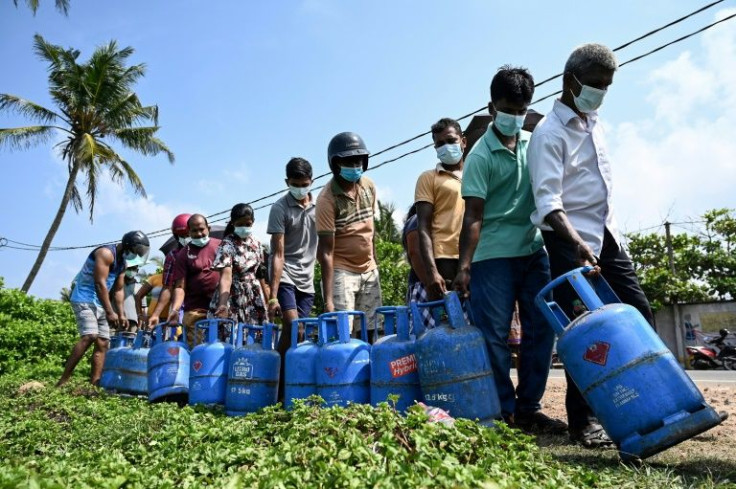It Is Now The Rajapaksas Versus People In Sri Lanka

By imposing and later revoking the islandwide emergency, Sri Lankan President Gotabaya Rajapaksa has converted what was essentially economic mismanagement into political unrest and a humanitarian crisis in the South Asia nation.
In a late-night gazette notification, the president said he has withdrawn the Emergency Rule Ordinance which he imposed on April 1 to give security forces sweeping powers to curb unrest in the country which was slated to host a mass-scale protest on April 3.
The revocation assumes significance as the ruling coalition is on shaky ground after 40 MPs in the 225-member parliament declared their independence from it. The emergency order needs the green signal of the house after two weeks of it coming into force.
Sri Lanka People's Party (SLPP), the second-largest in the coalition, officially conveyed to Rajapaksa that its 14 members would not support the motion.
Interestingly, the administration of President Gotabaya Rajapaksa and the government headed by his elder brother, Prime Minister Mahinda Rajapaksa, is still defending its actions, blaming it largely on the pandemic-driven economy where the tourism dried up and inward remittances waned.
The nation's post-war economy relied on high debts to increase exports and built fancy infrastructures to attract private investments but failed to achieve those goals due to appropriate policies to back up.
This is the second time within a year that Rajapaksa has declared an emergency. Earlier, it came in the form of an economic emergency declared on August 30 last year to curb a food shortage that was caused due to a ban on the import of fertilizers and Sri Lanka's plan to go organic.
Despite revenue collections coming down astronomically, by nearly 2 percent of the country's gross domestic product (GDP), the government was on a spending spree and fancy projects, for which money was borrowed from Japan, China, India, and global markets, turned white elephants as they failed to generate income for the public exchequer.
The incompetent government was too slow to react to the impending foreign exchange crisis and when acted, did it in a knee-jerk manner, resulting in a further downgrade of the country in the global financial market by rating agencies.
Despite interventions by financial institutions, the leadership failed to chalk out a systematic strategy for preventing degradation and an economic recovery plan was never initiated at the national level.
Seeking solutions to the economic owes, the angry mob vented out their ire at senior ruling party members and assembled in large numbers near their homes. Near the president's private residence, demanding his resignation, they pulled down steel barricades to secure entry inside. The president retaliated by arresting a few and imposing a curfew in most parts of Colombo city, which was later extended island-wide.
The economic crisis has hit medical supplies with medical unions asking the government to declare a national health emergency over a shortage of life-threatening drugs. The powerful Government Medical Officers' Association (GMOA) called a meeting and declared a medical crisis on April 5.
At the heart of Sri Lankan's humanitarian crisis is the shortage of two fuel items -- liquefied petroleum gas and diesel -- bringing daily life to a grinding halt in the import-reliant nation in the Indian ocean.
A lack of fuel means no place to work as companies cannot operate; because towers fail to function mobile phones are out of order, and an LPG shortage means going hungry at home.
People are heading towards supermarkets with their hard-earned money to pick up as many food items as possible, forcing supermarkets to initiate some sort of informal rationing. But there is no point in buying perishable stuff in bulk because of the power cut.
As the government is busy with its own internal contradictions of the Rajapaksa clan feud, the Ceylon Electricity Board (CEB) sees no bright future ahead for the Island nation.
The day when the CEB came out with the 13-hour daily power cut from March 31, its chairman, a political appointee, revoked God's name to save the country: "When God gives rain and CPC [Ceylon Petroleum Corporation] gives fuel, CEB can give power."
The inability to make ends meet has pushed people to take to the streets and six protests took place in and around the capital Colombo on April 1, the day state of emergency came into force. In a swift and brutal reprisal, the government deployed the riot police, water cannons, and armored vehicles.
Since March 30, hardly a few fishermen venture into the sea as kerosene or diesel for their boats is difficult to get. Fishermen in the north have to dispatch their catch to the Western Province to get maximum profit. But with refrigerated trucks hard to find, they end up selling their catch locally. Thus fish, a cheap source of protein for the Islanders has become dearer.
Namal Rajapaksa, heir apparent to the current incumbent, and one of six Rajapaksas who are enjoying the status of cabinet ministers tried to put up a brave face: "...These are difficult times but I believe we will overcome them...," Namal said on Twitter on March 30.
Who will benefit if Sri Lanka with its 22. 36 million population fails? Stakes are high for India and China. New Delhi also faces a refugee crisis due to its ethnic closeness with Sri Lanka's Tamil-speaking areas in the Northern and Eastern provinces.
The Chinese presence in the ill-administered country cannot be missed: There are the Chinese-built expressways and Chinese-built imposing Lotus Tower and signs in Mandarin are a familiar sight.
The troubles seem never-ending for Sri Lanka which is currently ruled by South Asia's only political dynasty that is confidently nepotistic.





